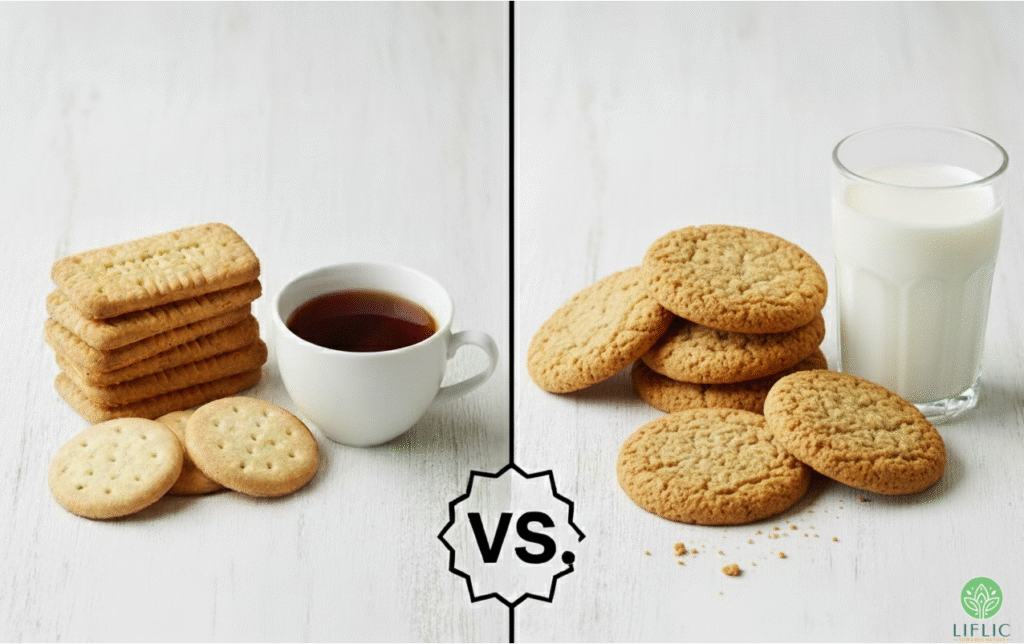
In today’s fast-paced lifestyle, snacks have become an essential part of our daily routine. From tea time munching to mid work cravings, we all reach out for something crunchy and satisfying. For most of us, that choice comes down to either biscuits or cookies. But here’s the important question: are we choosing snacks that support our health, or ones that simply satisfy our taste buds for a few minutes? At first glance, biscuits and cookies may look similar, but when you compare normal biscuits made from refined flour with our naturally made wheat cookies prepared with low RPM technology, the difference is striking. Wheat cookies are not only tastier but also far healthier, making them the perfect alternative for mindful eaters.
Whole Wheat Vs Refined Flour: The Core Difference:
The biggest difference between wheat cookies and regular biscuits lies in the flour used.
Whole Wheat Flour (used in wheat cookies):
Refined Flour / Maida (used in normal biscuits):
This makes wheat cookies, especially organic cookies, a healthier everyday snack.
Role of Low RPM Technology:
One of the lesser-known but highly important aspects of baking is the RPM (rotations per minute) processing speed.
This makes low RPM wheat cookies closer to naturally prepared, eggless cookies instead of heavily processed foods.
Nutritional Comparison: Wheat Cookies Vs Normal Biscuits:
| Feature | Wheat Cookies (Whole Wheat) | Normal Biscuits (Refined Flour) |
| Main Ingredient | Whole Wheat Flour | Refined Flour (Maida) |
| Fiber Content | High – supports digestion | Low – can cause constipation |
| Processing | Low RPM (nutrient preserving) | High-speed (nutrient loss) |
| Additives | Minimal, natural preparation | Often artificial flavours & sugar |
| Health Impact | Aids digestion, supports energy & heart health | Empty calories, sugar spikes |
Digestive Health and Satiety:
One of the strongest arguments in favour of wheat cookies is their fiber content.
This is why many health-conscious families are shifting to sugar free cookies and wheat-based snacks.
Long-Term Health Impact:
Wheat Cookies (Whole Wheat Benefits):
Regular Biscuits (Refined Flour Risks):
Practical Uses of Wheat Cookies:
Because of their balanced nutrition and taste, wheat cookies are suitable for different age groups and lifestyles:
Whether you’re looking for eggless cookies for family snacking or sugar free cookies for fitness-friendly diets, wheat cookies fit the need perfectly.
Why Naturally Made Matters:
Most biscuits in the market rely on synthetic flavours and preservatives to enhance taste and increase shelf life. While these make products more appealing, they add little nutritional value.
Wheat cookies, especially when prepared with natural methods and low RPM baking, retain their authentic flavour and texture without the need for artificial additives. This makes them not just healthier but also safer for long-term consumption.
Liflic Organic Wheat Cookies – A Wholesome Choice:
For individuals looking to align their snacking habits with long-term wellness, Liflic Organic Wheat Cookies are a smarter, more sustainable choice. They:
Made with 100% whole wheat flour and baked gently using our low RPM process, Liflic cookies preserve nutrients, deliver natural taste, and remain free from refined flour, preservatives, and excess sugar. Perfect for tea-time, office breaks, or guilt-free family snacking, they bring together nutrition and flavour in every bite.
Frequently Asked Questions (FAQs):
Copyright © 2025 Magar Natural Food | All Rights Reserved | Created & Crafted by Itorix Infotech LLP